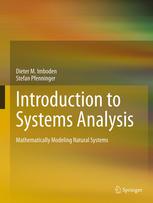

Most ebook files are in PDF format, so you can easily read them using various software such as Foxit Reader or directly on the Google Chrome browser.
Some ebook files are released by publishers in other formats such as .awz, .mobi, .epub, .fb2, etc. You may need to install specific software to read these formats on mobile/PC, such as Calibre.
Please read the tutorial at this link: https://ebookbell.com/faq
We offer FREE conversion to the popular formats you request; however, this may take some time. Therefore, right after payment, please email us, and we will try to provide the service as quickly as possible.
For some exceptional file formats or broken links (if any), please refrain from opening any disputes. Instead, email us first, and we will try to assist within a maximum of 6 hours.
EbookBell Team

4.0
86 reviewsSystems and their mathematical description play an important role in all branches of science. This book offers an introduction to mathematical modeling techniques. It is intended for undergrad students in applied natural science, in particular earth and environmental science, environmental engineering, as well as ecology, environmental chemistry, chemical engineering, agronomy, and forestry.
The focus is on developing the basic methods of modeling. Students will learn how to build mathematical models of their own, but also how to analyze the properties of existing models. The book neither derives mathematical formulae, nor does it describe modeling software, instead focusing on the fundamental concepts behind mathematical models. A formulary in the appendix summarizes the necessary mathematical knowledge. To support independent learners, numerous examples and problems from various scientific disciplines are provided throughout the book. Thanks in no small part to the cartoons by Nikolas Stürchler, this introduction to the colorful world of modeling is both entertaining and rich in content